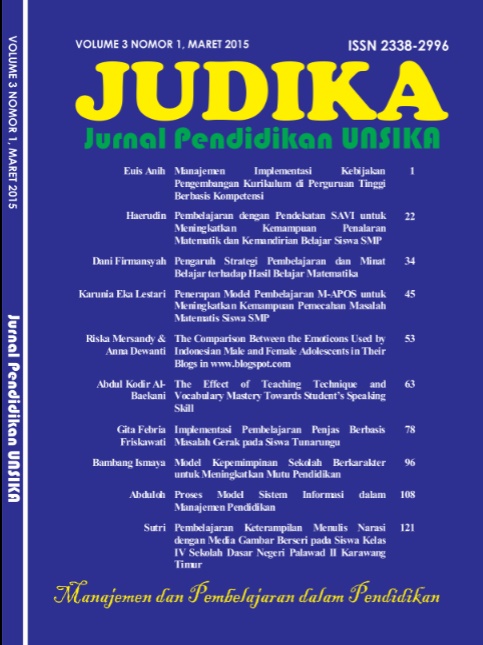THE EFFECTS OF TEACHING TECHNIQUE AND VOCABULARY MASTERY TOWARDS STUDENT’S SPEAKING SKILL
DOI:
https://doi.org/10.35706/judika.v3i1.202Abstract
The aim of this research is to know if there are effects of teaching technique and vocabulary mastery towards student’s speaking skill at State Senior High Schools in Karawang West Java. The population of this research is all the state senior high school students in Karawang. Meanwhile, the sample of this research is 60 students from two schools taken randomly. This research is quasi experimental design research with two factors; teaching technique using guessing song and conventional technique and vocabulary mastery. The data about vocabulary mastery and speaking skill are taken through tests. It has tested the validity and reliability test. The data analysis, the researcher used SPSS (Statistical Product and Service Solution) Program version 17,00. The result of data descriptive analysis in experimental class (A1) has mean score 77,83, it is more than in control class (A2) that has a mean score 68,83. Thedescription shows that the experimental class is successful. Testing of three hypothesis used ANOVA (analisis on varians), it has gotten the sig score sig= 0,00 in guessing song teaching technique and vocabulary mastery. Therefore, the interaction guessing song teaching technique and vocabulary mastery got sig= 0,213, it means that the first hypothesis; there is significant effect of guessing song teaching technique towards student’s speaking skill is accepted. The second hypothesis; there is significant effect of vocabulary mastery towards student’s speaking skill is also accepted, while the third hypothesis; there are the effects of teaching technique using guessing song and vocabulary mastery towards student’s speaking skill is rejected.
Keyword: Teaching Technique, Vocabulary Mastery, Speaking Skill.
Downloads
References
Allen, D. (2000). Microteaching. Massachusetts: Addison-Wesley Publishing Company
Alwasilah, A. C. (1993). Linguistik Suatu Pengantar. Bandung: Angkasa.
Anderson, J. (1969). Public Policy Making. New York: Holt, Rinehart and Wiston
Arends, R.I. (2008). Learning to Teach. Terjemahan. Yogyakarta: Pustaka Pelajar
Arikunto, S. (2006). Prosedur Penelitian Sebagai suatu Pendekatan Praktek. Jakarta: Rineka Cipta.
Blatner, A. (1995). Role Playing in Education. [online]. Tersedia: http://www.blatner.com/adam/pdntbk/rlplayedu.html. Jurnal Internasional (9 Mei 2012)
Brown, H.D. (1994). Teaching by Principles : An interactive Approach to Language Pedagogy. New Jersey: Prentice Hall Regents.
Cohen, L., and Manion Lauwrence. (1994). Research Methods in Education. London and New York: Routledge
David, H. (1979). Testing Speaking as a Second Language. New York: Hill Book Company.
Dimas, I. (2003). Pintar Percakpan Bahasa Inggris. Surabaya: Amanah.
Finocchiaro, M., and Michael Bonomo. (1973). The Foregn Language Learner: A Guide for Teacher. Regents Publishing Company, Inc.
Fritz, W. S. (1989). Epistemic Logic and the Theory of Games and decisions. New York: Kluwer Academic Publisher.
Fraenkel, J. R and Norman. (2003). How to Design and Evaluate Research in Education. Mc Graw-Hill.
Gerard, V. (1985). Games Real Actor Play. New York: Kluwer Academic Publisher.
Harmer, J. (2002). How to Teach Vocabulary. Englan: Longman.
Hornby, A.S. (1989). Oxford Advanced Learner’s Dictionary of Current English. Fourth Edition. New York: Oxford University Press.
_ _ _ _ _ _ _. (1995). Oxford Advanced Learner’s Dictionary. New York: Oxford University Press.
Hughes, B. (2002). Software Project Management. Edisi ke-3. London: McGraw - Hill
Kurikulum Tingkat Satuan Pendidikan. 2006. Jakarta: Depdiknas.
Katherine, H, and Pyton Geofrey. (1989). Heinemann English Dictionary. New Edition. Oxford: Heineman Educational.
Jones, G. R. (1998). Understanding and Managing Organizational Behaviour. Fifth Edition. Upper Saddle River: Pearson Prentice Hal
Lado, R. (1964). Language Teaching: A Scientific Approach. USA: Mc Gram-Hill, Inc.
Lazaraton, A. (2001). “Teaching Oral Skillsâ€. In M. Celse-Murcia (Ed). Teaching English as a second foregn language. Boston: Heinle an Heinle
Ma’mun, I. (1990). An Ontology of TEFL. Jakarta: Bumi Aksara
Morley, J. (2005). Pragmatis in EFL Clasroom. Bologna: Modern English Publication Ltd
Nauth, W. H. (1995). The World Book Encyclopedia. Chicago: World Book
Notion, P. (1990). Teaching and Learning Vocaburay. Boston: Heinle
& Heince Publisher.
Nuraini, D.H. (2008).
Nurgiantoro, dkk. (2009). Statistika Terapan untuk Penelitian Ilmu-Ilmu Sosial. Yogyakarta: Gadjah Mada University Press.
O’Malley, J.M. & Pierce, L.V. (1996). Authentic assessment for English language learners: Practical approaches for teachers. New York: Addison Wesley Longman, Inc.
Scharpf, F.W. (1989). Games Real Actors Play. Actors_Centered Institutionalism in Policy Research. Boulder and Oxford: Westview Press.
Read, J. (2000). Vocabulary Assessment. Cambridge: Cambridge University Press.
Rhori, J. (1989). Speaking & Listening. London: John Murry Published Ltd.
Richard, Jack C. and Willy A. Renandya. (2000). Methodology in Language Teaching. Cambridge : Cambridge University Press
Richards, J. C, and Theodore S. Rodgers. (1986). Approaches and Methods in Language Teaching. Cambridge: Cambridge University.
Swan, M. (1995). Practical English Usage. Hongkong: Trade Spool Ltd.
Tarigan, H. G. (1993). Prinsip-Prinsip Dasar Sastra. Bandung: Angkasa
Thornbury, S. (2002). How to Teach Vocabulary. Harlow: Longman.
_ _ _ _ _ _ _ _. (2005). How to teach speaking. Harlow, England: Longman.
Uno, H. B. (2008). Model Pembelajaran. Jakarta: Bumi Aksara.
Weaver, A.T. (1959). The Teaching of Speech. New Jersey: Prentice Hall Regents.



